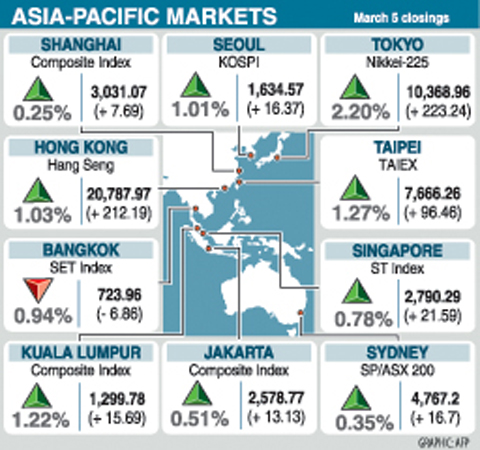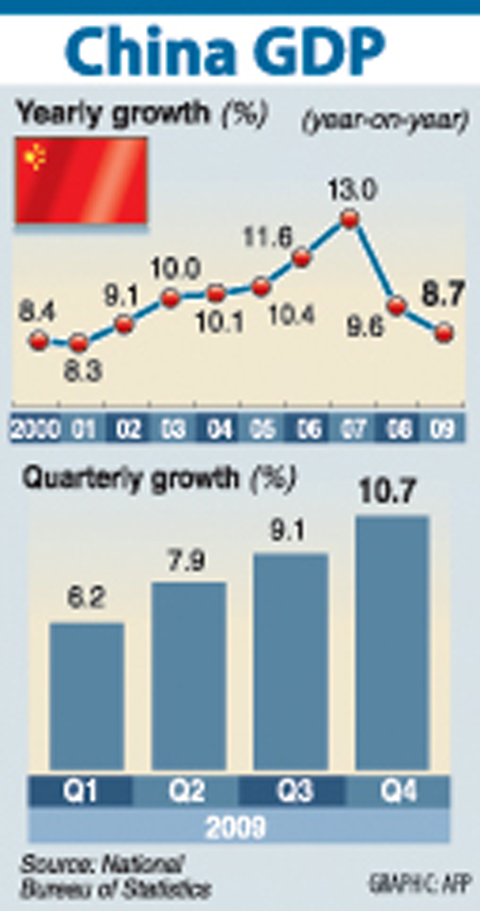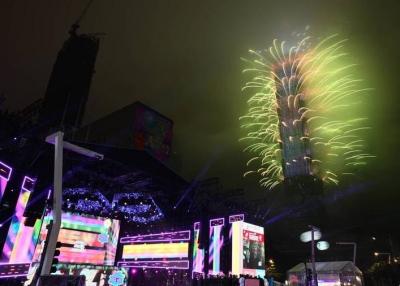Asian stocks rose for a second week, almost erasing the MSCI Asia-Pacific Index’s losses this year, as reports on global semiconductor sales, Indian manufacturing and US jobless claims boosted optimism for an economic revival.
Rio Tinto Group, the world’s third-biggest mining company, gained 6.4 percent in Sydney as metal prices climbed on speculation a recovery will boost demand for metals. Sumco Corp jumped 9.3 percent, leading gains by chip-related stocks. Li & Fung Ltd (利豐), the biggest supplier for retailers including Wal-Mart Stores Inc, and Canon Inc, which gets about 27 percent of sales from the US, advanced more than 5 percent. Tata Motors Ltd, India’s biggest truckmaker, surged 12 percent.
“There’s been quite an abundance of leading indicators pointing to an improving employment backdrop,” said Nader Naeimi, an investment strategist in Sydney at AMP Capital Investors, which oversees about US$90 billion globally. “Jobs are key to the sustainability of the recovery.”

The MSCI Asia-Pacific Index gained 1.9 percent this week, paring its decline this year to 0.1 percent. The gauge has lost 5.1 percent since reaching a 17-month high on Jan. 15 amid concern governments will start withdrawing economic-stimulus measures and that Greece may struggle to curb its budget deficit.
Japan’s Nikkei 225 Stock Average increased 2.4 percent, its largest gain this year. India’s Sensitive Index surged 3.4 percent, this week’s biggest advance among benchmarks in the Asia-Pacific region, after reports showed the nation’s exports and manufacturing output climbed.
China’s Shanghai Composite Index slipped 0.7 percent on concern bank lending may slow and interest rates will rise as inflation accelerates. Hong Kong’s Hang Seng Index rose 0.9 percent. Australia’s S&P/ASX 200 Index increased 2.8 percent even as the nation’s central bank raised its benchmark interest rate to 4 percent from 3.75 percent on March 2.

Raw-material suppliers advanced the most this week among the MSCI Asia-Pacific Index’s 10 industry groups, followed by information-technology companies, on speculation a global recovery will boost demand for commodities.
The MSCI Asia-Pacific Index on Friday rose the most this week, after a US Labor Department report showed the country’s claims for jobless benefits dropped in the week ended Feb. 27 and the yen weakened against the dollar on speculation the Bank of Japan will further ease monetary policies.
India’s government said on March 2 that the country’s exports rose for a third consecutive month in January, while a report on March 1 showed South Korea’s exports rose for a fourth month in February. A report the same day showed Japan’s unemployment rate unexpectedly fell to a 10-month low in January.
Li & Fung, which gets 62 percent of sales from the US, climbed 8.7 percent to HK$39.25. Billabong Ltd, the Australian surf-wear maker that gets half of sales from the US, gained 4.8 percent to A$10.66. Canon, which is the world’s biggest camera maker and gets 28 percent of its sales in the Americas, increased 5.3 percent to ¥3,890.
The MSCI Asia-Pacific Index surged 34 percent last year as governments worldwide boosted spending and central banks lowered interest rates to help restore economies battered by the global recession. This year, potential gains have been weighed down by concern governments from China to the US and India will tighten lending and withdraw stimulus policies amid signs the recovery is continuing.

The Taipei MRT is open all night tonight following New Year’s Eve festivities, and is offering free rides from nearby Green Line stations. Taipei’s 2025 New Year’s Eve celebrations kick off at Taipei City Hall Square tonight, with performances from the boy band Energy, the South Korean girl group Apink, and singers Gigi Leung (梁詠琪) and Faith Yang (楊乃文). Taipei 101’s annual New Year’s firework display follows at midnight, themed around Taiwan’s Premier12 baseball championship. Estimates say there will be about 200,000 people in attendance, which is more than usual as this year’s celebrations overlap with A-mei’s (張惠妹) concert at Taipei Dome. There are

NEW YEAR’S ADDRESS: ‘No matter what threats and challenges Taiwan faces, democracy is the only path,’ William Lai said, urging progress ‘without looking back’ President William Lai (賴清德) yesterday urged parties across the political divide to democratically resolve conflicts that have plagued domestic politics within Taiwan’s constitutional system. In his first New Year’s Day address since becoming president on May 20 last year, Lai touched on several issues, including economic and security challenges, but a key emphasis was on the partisan wrangling that has characterized his first seven months in office. Taiwan has transformed from authoritarianism into today’s democracy and that democracy is the future, Lai said. “No matter what threats and challenges Taiwan faces, democracy is the only path for Taiwan,” he said. “The only choice

CORRUPTION: Twelve other people were convicted on charges related to giving illegal benefits, forgery and money laundering, with sentences ranging from one to five years The Yilan District Court yesterday found Yilan County Commissioner Lin Zi-miao (林姿妙) guilty of corruption, sentencing her to 12 years and six months in prison. The Yilan District Prosecutors’ Office in 2022 indicted 10 government officials and five private individuals, including Lin, her daughter and a landowner. Lin was accused of giving illegal favors estimated to be worth NT$2.4 million (US$73,213) in exchange for using a property to conduct activities linked to the 2020 Chinese Nationalist Party (KMT) presidential and legislative election campaigns. Those favors included exempting some property and construction firms from land taxes and building code contraventions that would have required
TECH CORRIDOR: Technology centers and science parks in the south would be linked, bolstering the AI, semiconductor, biotech, drone, space and smart agriculture industries The Executive Yuan yesterday approved a “Southern Silicon Valley” project to promote the development of an artificial intelligence (AI) and semiconductor industry in Chiayi County, Tainan, Pingtung County and Kaohsiung. The plan would build an integrated “S-shaped semiconductor industry corridor” that links technology centers and science parks in the south, Executive Yuan spokesperson Michelle Lee (李慧芝) said yesterday after a Cabinet meeting. The project would bolster the AI, semiconductor, biotech, drone, space and smart agriculture industries, she said. The proposed tech corridor would be supported by government efforts to furnish computing power, workforce, supply chains and policy measures that encourage application and integration